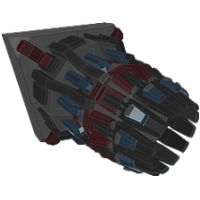Difference between revisions of "Ion Engine - Tech 2"
From Interstellar Rift Wiki
m |
m (→Description) |
||
| Line 45: | Line 45: | ||
}} | }} | ||
===Description=== | ===Description=== | ||
| − | This is the largest engine currently available, and the only one requiring installation on the interior of the ship. Producing 2,000,000 thrust, it provides around seven times the thrust of the next engine, the largest externally mounted, which produces 280,000 thrust. To operate this (1) engine at full power, some possibilities include one large hydrogen generator, eight small hydrogen generators, or eight charged small batteries among other design choices. | + | This is the largest engine currently available, and the only one requiring installation on the interior of the ship. Producing 2,000,000 thrust, it provides around seven times the thrust of the next engine, the largest externally mounted, which produces 280,000 thrust. To operate this (1) engine at full power, some possibilities include one large hydrogen generator, eight small hydrogen generators, or eight charged small batteries among other design choices. See also the [[Comparison Tables#Engines|Engine Comparison Table]]. |
---- | ---- | ||
Revision as of 16:21, 15 February 2017
| Class 1 Ion Engine - Tech 2 | |
|---|---|
 | |
| Ion Engine - Tech 2 | |
| Provides propulsion for large spacecraft. Consumes power continuously when providing thrust. | |
| Device Type | Prop |
| Thrust | 2,000,000 |
| Maneuverability thrust | 5000 |
| Drain | 800 (in use) |
| Connections | Must be connected to a power source (electricity) |
| Location in editor | Interior edit mode, Systems |
| Interior Size |
2x2x2 interior rooms 4x4x4 meters |
| Exterior Size |
7x4x4 exterior tiles 14x8x8 meters |
| Build Costs |
3750 Steel 250 Iron 750 Copper 375 Silicon |
| Weight | 800 |
| Category: Engines | |
Description
This is the largest engine currently available, and the only one requiring installation on the interior of the ship. Producing 2,000,000 thrust, it provides around seven times the thrust of the next engine, the largest externally mounted, which produces 280,000 thrust. To operate this (1) engine at full power, some possibilities include one large hydrogen generator, eight small hydrogen generators, or eight charged small batteries among other design choices. See also the Engine Comparison Table.